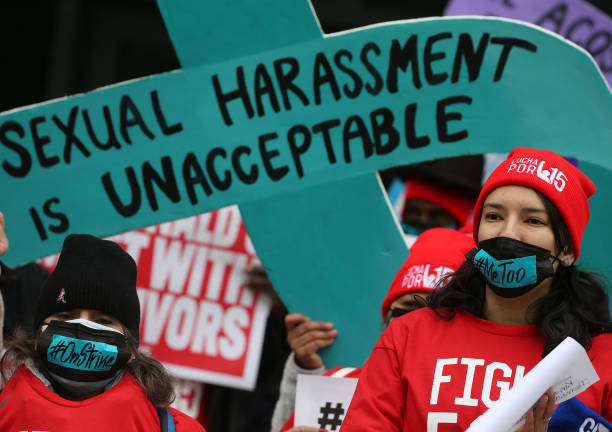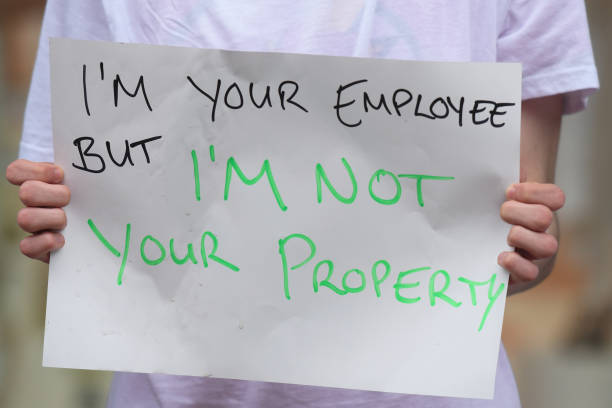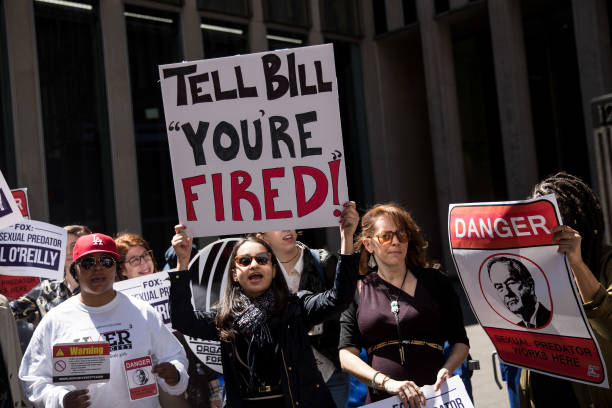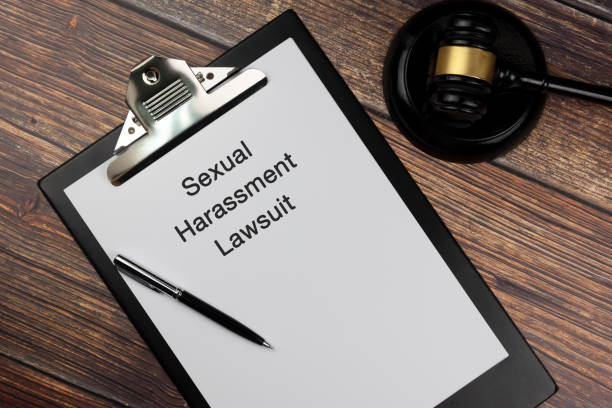
After hours behaviour: sexual harassment
Many people believe that once they clock out of work they are done for the day, and they can do whatever they want. Well in the current era of social media, after work drinks, and various afterhours work requirements it may surprise people to find out that they can be dismissed for their behaviour outside of the office.
One scenario that has become more prominent in employment law is after hours sexual harassment. Most people would understand that kissing or grabbing your co-worker at the office Christmas party is a bad idea, but some people seem to think that this is an appropriate way to act! When these employees are ultimately fired, they then try to claim unfair dismissal when action is taken against them! So how do we unpack what is acceptable after hours?
What is sexual harassment?
First let’s define sexual harassment. Sexual harassment under the Fair Work Act 2009 (Cth) is described as “an unwelcome sexual advance”, “an unwelcome request for sexual favours” and other “unwelcome conduct of a sexual nature”. While some people think that they are desirable and that any advances by themselves will be well received, an unwelcome advance is any act that could reasonably be perceived as offensive, humiliating, or intimidating. This is an objective test based on how a reasonable person would interpret the behaviour.
Some examples of sexual harassment may include touching, staring, sexualised comments or jokes, a sexually explicit picture being shown, an unwanted invite on a date, asking for sex, inappropriate invasive questioning about an individual’s life or body, an insult of a sexual nature, or a text message that has sexual content in it. While this is a comprehensive list any inappropriate acts that make an individual uncomfortable may still constitute as sexual harassment or at least bullying or discrimination!
Another myth that many employees and employers believe is that sexual harassment is a continued or repeated act whereas a one-off comment is negligible. This is not true. Even a one-off incident can be considered sexual harassment which can lead to a dismissal. While the Fair Work Commission can deal with some sexual harassment complaints, most cases go through anti-discrimination tribunals either at a Commonwealth or state level.

Penalized for sexually harassing another employee outside of work?
So, one may ask, has anyone ever been penalized for sexually harassing another employee outside of work? The answer is yes. In Ewin v Vergara,[1] the complaint went all the way to the Federal Court where the complainant was awarded $476,163 in damages for the PTSD and other psychiatric conditions they suffered. It was found that the complainant had been sexually harassed within the meaning of the Sex Discrimination Act 1984 (Cth) through conduct that occurred outside the employer’s premises and outside of working hours.
As more people are working from home, outside office hours, or on jobs that require travelling, the court saw fit to expand the definition of ‘workplace’ so that it could be interpreted within modern working scenarios. Ms Ewin (complainant) made complaints about increasingly explicit and inappropriate comments by Mr Vergara. These comments were made in the office, as well as in a taxi, and hotel. Ms Ewin made the complaint after she was sexually assaulted by Mr Vergara in a corridor at their offices after a work function.
Who can the claim be made against?
While this case helped establish that sexual harassment could occur after hours, it also established that you do not need to be fellow employees at the same company for it to be deemed as sexual harassment in the course of your employment. A complication Ms Ewin faced was establishing that this was a workplace issue as Mr Vergara was a contractor at Ms Ewin’s company, meaning he was employed by a third party.
This meant that Mr Vergara did not fall within the meaning of ‘fellow employees’ of s 28B(2) of the Sex Discrimination Act 1984 since they had different employers. However, Ms Ewin was able to rely on s 28B(6) of the Sex Discrimination Act 1984 which states that a workplace participant cannot sexually harass another workplace participant if it is at the workplace of both of those persons, which it was.
Definition of a workplace
This expansion of the definition of ‘workplace’ now extends to any place that participants carry out work like functions in connection with their role as a workplace participant. This is why the sexual harassment could be attributed to have happened in the workplace despite it occurring in a common shared space (the corridor), the taxi, and the hotel, as the participants were participating in work like functions in these areas.

Many employees who sexually harass want to defend their position by stating they were just clowning around. Stating the employee took their advances or actions and comments the wrong way. This is serious conduct.
Not a new concept
This idea that sexual harassment could occur after hours and outside the workplace is not a new concept. One of the earlier cases of McManus v Scott-Charlton,[2] established that even phone calls made outside of working hours could constitute sexual harassment. Mr McManus kept expressing his romantic feelings for a co-worker who made it clear that they did not feel the same way. Mr McManus continued to harass his colleague with him eventually leaving an inappropriate message on her home phone machine.
The message stated Mr McManus’ feelings for the complainant and that he “wouldn’t mind marrying” her. When the complainant complained, Mr McManus had to go through disciplinary proceedings to which he complained stating that it was unlawful for him to be penalized for his actions outside of working hours. Justice Paul Finn held that it was completely lawful for an employer to provide a direction to prevent sexual harassment of a co-employee where it had some relation to the workplace. So, to those that believe this is a new concept, the case law and legislation has been progressively prohibiting sexual harassment with any relation to the workplace for decades now.
Fair work ruling
The Fair Work Commission has also ruled on the matter in the case of Keron v Westpac Banking Corporation,[3] which held firm that sexual harassment occurring outside the physical workplace can still constitute serious misconduct, and by extension dismissal. Mr Keron had worked for Westpac for almost 30 years, however, following an out of office training day Mr Keron sexually harassed a colleague at a bar. After the training day, Westpac put a bar tab at a nearby bar which led to an intoxicated Mr Keron touching his female co-worker.
Following an investigation Mr Keron was dismissed, however, he tried to claim unfair dismissal, stating that his actions had no connection to his employment as they were after hours and not on a work site. Deputy President Melanie Binet rejected this argument stating that the employees were only at this location because of the earlier training day which meant his actions occurred during the course of his employment.
Being drunk as an excuse
Another question that people may have is can being intoxicated excuse sexual harassment? The answer is no. Mr Keron tried to argue that the lines between workplace conduct and personal time had been blurred due to his own, and others’, consumption of alcohol. The Fair Work Commission dismissed this argument as alcohol consumption does not dismiss inappropriate touching without consent. The Commission also highlighted that while after hours conduct has been able to result in dismissal for some time, the current bar for what constitutes sexual harassment has been raised by the community in recent years, especially when committed at work or work related events.
Overall, it is extremely important to consider what you are doing both at work and outside of work. It has been proven both in the courts and the Fair Work Commission that sexual harassment will not be tolerated even if it occurs off work premises or in an employee’s private time. To avoid allegations of sexual harassment it is best to follow your company’s sexual harassment/ discrimination guidelines both at your workplace and after hours. Additionally, before making advances at colleagues consider whether there is potential for your actions to be construed as unwelcome or offensive and reconsider your behaviour if there is any uncertainty.

Procedural fairness must apply
While employers are required to follow procedural fairness if investigating incidents of sexual harassment, if they conclude that you have engaged in this behaviour they should, and likely will, terminate your employment. While you can file for unfair dismissal if you believe the allegations are false or your dismissal was harsh, unjust, or unreasonable, if any inappropriate behaviour can be linked to either another workplace participant (employee or contractor) or to your work premises, whether it’s your office or some other location you are at because of your job, then your application is likely to be dismissed.
The best advice to avoid any of the scenarios listed above, would be to keep your personal and professional lives separate and to treat everyone with respect and dignity.
Conclusion to: After hours behaviour: sexual harassment
I hope the article “After hours behaviour: sexual harassment” has been helpful reading for you. When the line between an employee’s work hours and their private life are blurred. It’s often difficult to determine if their after hours conduct comes under the purview of their employer. If you have been sexually harassed, inappropriately touched or spoken to we can help you determine what to do next and your rights.
We can help you make a claim to seek reinstatement or compensation. All matters relating to Fair work Australia and any of the anti discrimination boards, or human rights commissions we can help you. Call us now. Casual workers rights, employment rights , being forced to resign, toxic workplaces we will help you. We are proud of our staff and the outcomes they get for our clients.
Feel free to call our expert team on 1800 333 666 for a no obligation, confidential conversation about how we can help you seek justice and compensation for your distress and abuse you have suffered.

Citations for After hours behaviour: sexual harassment
[1] (No 3) [2013] FCA 1311
[2] (1996) 70 FCR 16
[3] [2022] FWC 221













